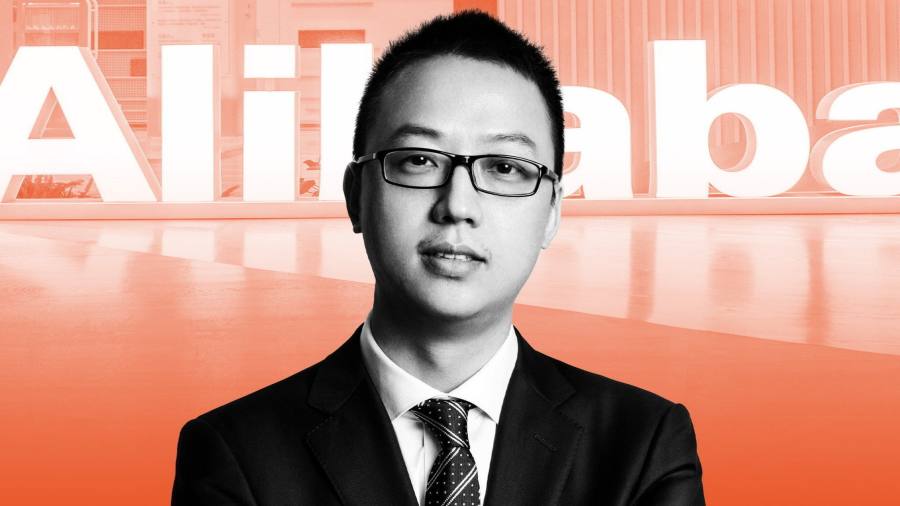Receive free Eddie Wu updates
We’ll send you a myFT Daily Digest email rounding up the latest Eddie Wu news every morning.
When Alibaba co-founder Eddie Yongming Wu struck out on his own eight years ago, he did not stray far from mentor Jack Ma.
For the investment fund he was setting up, he picked an office in the central Hangzhou wetlands, a few ponds over from where Ma held court and practised tai chi. Wu also stayed on as Ma’s special assistant and remained a member of the Alibaba partnership, which functions as a de facto board for the group.
“Jack and Eddie have a close, trusted relationship,” said one former Alibaba executive.
Now nearly two decades after founding Alibaba with Ma and 16 others, the 48-year-old Wu is set to preside over the break-up of the tech empire they built. Wu will in the autumn take over as chief executive while the group’s vice-chair Joe Tsai will step up as chair.
Alibaba is betting that slimming down and returning to its roots in ecommerce will help it regain market share surrendered to fledgling online platforms such as Pinduoduo and ByteDance’s Douyin. It is spinning off other major business lines, from food delivery to supermarkets, with ecommerce platforms Taobao and Tmall set to remain the group’s main wholly owned businesses.
“Eddie and Teacher Ma are really symbiotic,” said one longtime Alibaba employee. “Eddie admires Teacher Ma, his ideas and philosophy and will be excellent at executing his vision,” the person said.
Ma will remain without an official position at Alibaba but plans to be more deeply involved, according to people close to the group. On Tuesday photos of Ma having a farewell coffee at Alibaba’s headquarters with outgoing chief executive Daniel Zhang flooded the Chinese internet.
Ma faces the delicate task of engineering Alibaba’s turnround without setting off alarm bells in Beijing. Top Communist party officials may worry about his attempting to rekindle his political influence, which sparked his downfall more than two years ago after giving a crusading speech in Shanghai.
“It may speak to Jack’s situation that he can’t really make a full comeback, given the 2020 speech,” said Duncan Clark, author of Alibaba: The House that Jack Ma Built. “Having a proxy makes sense,” he said.
The former Alibaba executive said Ma had no interest in returning to run the business day to day. “Jack is playing the role of architect. What he knows best are people and how to match them together,” he said. “Jack is trying to bring Alibaba back to its roots: as it got larger, the culture became diluted.”
Wu joined Ma’s start-up China Pages after graduating from university in 1996 as one of its first developers. “Ma told me about business and his vision; I found him witty and inspiring,” Wu later said in an interview at Tsinghua University.
Soon China Pages split up and Ma took some of the team north to Beijing to run a website for China’s trade ministry. “We picked team members and Wu Yongming went with Jack,” recalled He Yibing, co-founder of China Pages, in an interview with the Financial Times.
“Wu is very hardworking,” He said. “At one point we imported some computer workstations and servers and all the manuals were in English. His English skills were not very good, but he dove into those manuals, checking words in the dictionary so he could put the machines together.”
After Ma left Beijing, Wu was one of 18 co-founders who piled into his Hangzhou apartment in 1999 to create his next venture, Alibaba. “He was a talented young guy who believed in Jack and Jack trusted him,” said He.
Some years later Ma put him in charge of building Alimama, the advertising engine that would go on to mint money for the company’s ecommerce businesses. His stint there earned him the nickname of Mama Wu internally, several employees said.
“Part of the nickname came from setting up Alimama, but it was also because Mama Wu was always taking care of us, fixing bugs or new architectures,” said a former Alimama team member. “He always finds a way to sort it out.”
The person added: “As a co-founder close to Ma, he could always get us the resources we needed.”
Wu then built the Taobao shopping app, which evolved quickly into a critical part of Chinese consumers’ daily shopping habits. After Alibaba’s New York listing he became a special assistant to Ma. For a period he was following Ma everywhere, people close to both men said.
In 2015, Wu stepped back from Alibaba, chairing its healthcare arm while launching Vision Plus Capital, the venture capital firm set up beside Ma’s personal office in the wetlands. The group has backed several Alibaba employees venturing out on their own such as Qiang Hui of digital healthcare company Come-Future and Jerry Wang of Tuya. It now has more than $1bn in assets under management, according to filings with the US Securities and Exchange Commission.
Several Alibaba employees suggested Wu’s investing experience would be beneficial for the group as it turns into a holding company, in charge of directing the profits spun up by Taobao and Tmall.
Wu’s first task will be reversing the platforms’ decline. Ma is pushing the group to refocus on small and medium-sized Taobao sellers instead of the big brands that dominate on Tmall. Last month he told employees that Alimama, the ad platform Wu built, was key to the group’s future, according to two people briefed on the meeting.
“The company has kept shifting strategy without achieving anything substantial,” said one Alibaba manager. “The main issues lie with management. Since Jack Ma there hasn’t been any really great leader,” the person said.
Additional reporting by Nian Liu in Beijing
Read the full article here




